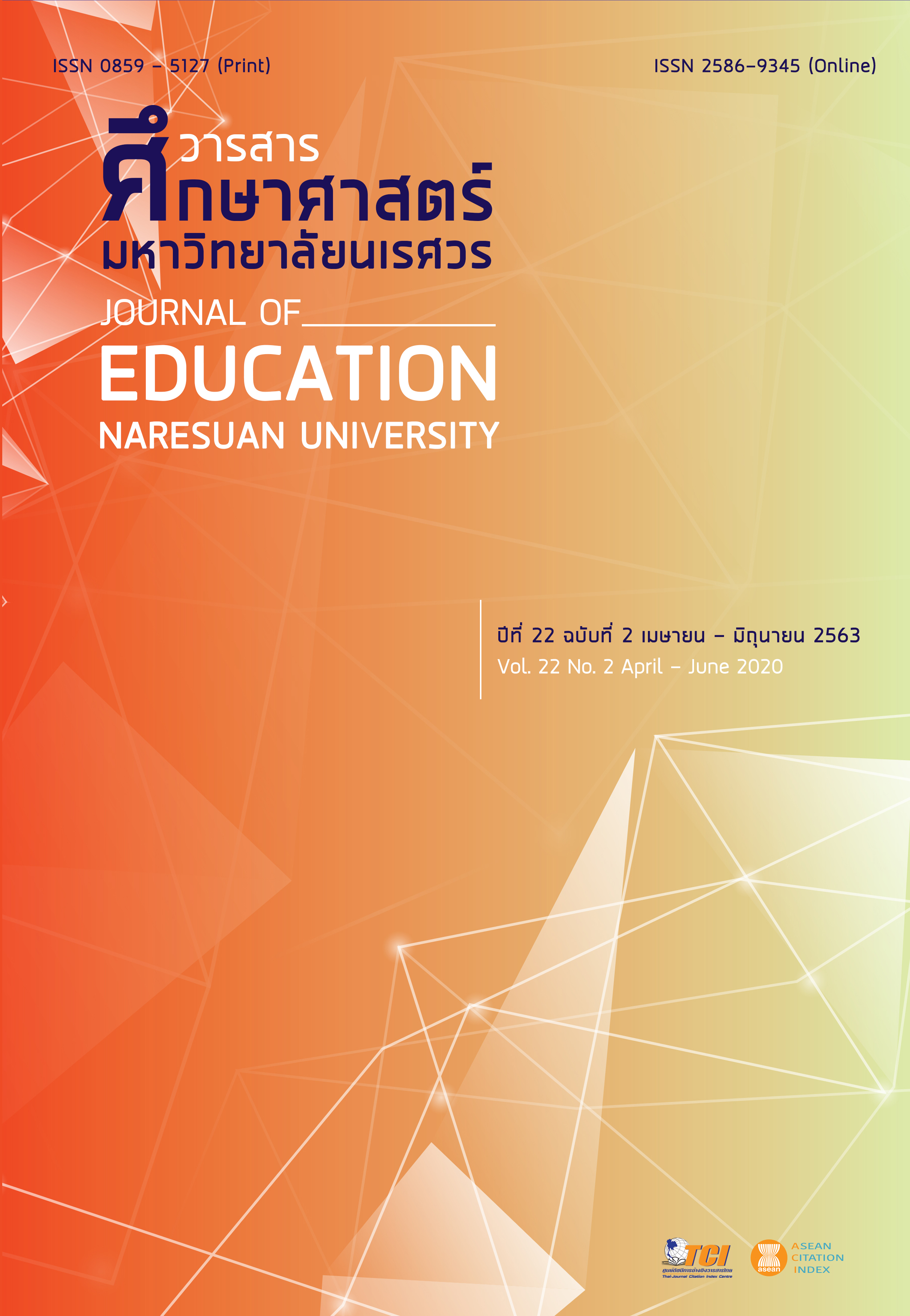ENGLISH LEARNING MANAGEMENT FOCUSING ON PROBLEM-BASED LEARNING TO PROMOTE ENGLISH WRITING ABILITY AND ENGLISH SELF-LEARNING OF ELEVENTH GRADE STUDENTS
Main Article Content
Abstract
The purposes of this research were to study English writing ability of the students after using problem-based learning and to compare English self-learning before and after using the problem-based learning. The target group was 44 eleventh grade students who enrolled in an English reading and writing course (E32203) in the first semester of the academic year 2017 at Chakkham khanathon Lamphun school, Lamphun province. The research instruments consisted of 5 lesson plans which applied the use of problem-based learning, English writing assessment form, and English self-learning assessment form. The data obtained was analyzed by using the mean, standard deviation, and percentage. The findings of this research were as follows: 1) the students’ English writing ability passed the pre-set criteria of 60 percent, and 2) The students’ self-directed learning increased after they learned through problem-based learning.
Article Details
The owner of the article does not copy or violate any of its copyright. If any copyright infringement occurs or prosecution, in any case, the Editorial Board is not involved in all the rights to the owner of the article to be performed.
References
Arends, R. I. (2008). Learning to teach. New York: The McGraw-Hill.
Azman, N., & Ling, K. S. (2012). Problem-based learning in English for a second language classroom: Students' perspectives. International Journal of Learning, 18(6), 109-126.
Bureau of Academic Affairs and Educational Standards. (2007). Language for learning development. Bangkok: Khurusapha Ladprao printing. [in Thai]
Bureau of Academic Affairs and Educational Standards. (2008). Guiding for measurement and evaluation for learning. Bangkok: Ministry of Education. [in Thai]
Chee, T. S., Divaharan, S., Tan, L., & Mun, C. H. (2011). Self-directed learning with ICT: theory, practice, and assessment. Retrieved November 14, 2017, from https://ictedupolicy.org/system/files/self-directed_learning_with_ict.pdf
Hmelo-Silver, C. E. (2004). Problem-based learning: What and how do students learn? Educational Psychology Review, 16(3), 235-266. doi:10.1023/B:EDPR.0000034022.16470.f3
Hung, W. (2016). All PBL starts here: The problem. Interdisciplinary Journal of Problem-Based Learning, 10(2). Doi 10.7771/1541-5015.1604
Jacob, H. L., Zinkgraf, S. A., Wormuth, D. R., Heartfiel, V. F., & Hughey, J. B. (1981). Testing ESL composition: A practical approach. Massachusettes: Newburry House Publishers.
Kain, D. L. (2003). Problem-based learning for teachers, grades 6-12. Boston: Allyn and Bacon.
Kumar, R. R., & Refaei, B. B. (2017). Problem-based learning pedagogy fosters students' critical thinking about writing. Interdisciplinary Journal of Problem-Based Learning, 11(2), 1-9.
Liewthong, C., & Pimsarn, P. (2013). A study of an error analysis of english writing of eleventh grade students at Phanomsarakham “Phanom Adun Witthaya” School, Chachoengsao (Master thesis). Bangkok: Thammasat University. [in Thai]
Luchini, P. L. (2010). Evaluating the effectiveness of a complimentary approach to teaching writing skill. Retrieve 18 august 2017, from http://eds.b.ebscohost.com/ehost/pdfviewerpdfviewer? vid=1&sid=9a00371a-c214-4f6d-ba89-29e164323b86%40sessionmgr101
Mathews, A. (2007). Problem-based learning and adult English language learners. Retrieved December 17, 2016, from http://www.cal.org/adultesl/pdfs/problem-based-learning-and-adult-english-language-learners.pdf
Mayr, W. B. (2012). Creating a heritage trail through self-directed learning in the foreign language classroom. Journal of Linguistic Intercultural Education, 6(5), 67-94.
Olusegun, B. S. (2015). Constructivism learning theory: A paradigm for teaching and learning. Journal of research & Method in Education (IOSR-JRME), 6, 66-70.
Qayumi, S. (2001) Piaget and His Role in Problem Based Learning, Journal of Investigative Surgery, 14(2), 63-65, doi: 10.1080/08941930152024165.
Pongpisanu, et al. (2015). Development of a learning package to promote English communication ability using reading and writing practice for Prathomsuksa six students. Journal of Education Burapha University, 26(2), 10-19.
Rattanathongkam, S. (2013). Basic learning theories. Retrieved September 24, 2017, from fromhttps://ams.kku.ac.th/aalearn/resource/edoc/tech/56web/3learn_th56.pdf [in Thai]
Rinehart et al. (1986). Some effects of summarizing training or reading and studying. Reading research quarterly, 21 (4), 422-438.
Schmidt, H. G. (1993). Foundations of problem-based learning: some explanatory notes. Medical Education, 27(5), 422-432. doi:10.1111/j.1365- 2923.1993.tb00296.x
Schmidt, H. G. (2000). Assumptions underlying self-directed learning may be false. Medical Education, 34, 243–245. doi:10.1046/j.1365-2923.2000.0656a.x
Suwanpracha, K. (2013). Using group investigation based on local content to promote knowledge, English writing ability and group working skills among Mathayom Suksa 4 students (Master thesis). Chiangmai: Chiangmai University. [in Thai]
The National Institute of Educational Testing Service. (2016). Standard deviation O-NET score. Retrieved September 17, 2017, from http://www.newonetresult.niets.or.th/ [in Thai]
Wangpasit, L. (2016). Coaching for learning English with happiness. Journal of Education Naresuan University, 18(3), 351-363. [in Thai]
Watcharapanyawong, S., & Utsaha, S. (2012). Thai EFL students’ writing errors in different text types: The interference of the first language (Master thesis). Nakhon Ratchasima: Suranaree University of Technology. [in Thai]


